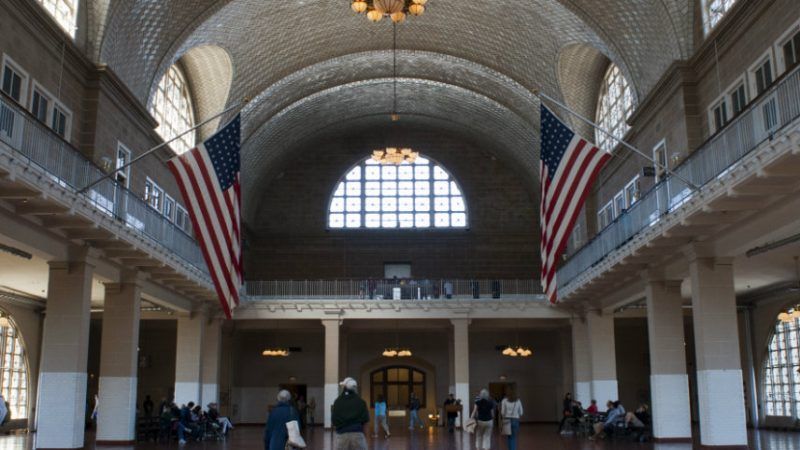Immigration Debate Could Use Some Historical Context
Maybe both sides need to take a trip to Ellis Island.

For a politician, President Trump has been unusually good at keeping promises.
He promised to cut taxes, and he did. He promised to move the American embassy in Israel to Jerusalem, and he did. He promised to renegotiate the North American Free Trade Agreement to get a better deal, and he did. He promised to nominate Supreme Court justices from a pre-released list, and he did.
One high-profile campaign promise that so far remains unfulfilled, though, is Trump's wall along the U.S.-Mexico border, the wall for which candidate Trump repeatedly said Mexico would pay.
Some design prototypes of the wall have been erected. In Texas and New Mexico, some sections of what had been a border fence have been replaced with a wall, or at least a taller, thicker fence. Trump has also cracked down on immigration via executive action in other ways—by attempting to end President Obama's Deferred Action for Childhood Arrivals program, by announcing steep reductions in a program that resettles refugees in America, by issuing an executive order restricting entry into the U.S. from certain countries, by dividing some families that arrive at the border, and by detaining some children.
Responsibility for the inaction on the wall stands with Congress as much as with Trump. Senators and representatives see it as one piece of a larger immigration compromise legislative package, in which border security funding is paired with some sort of path to legal status, even citizenship, for illegal immigrants already here. Congress and advocacy groups have been discussing such a deal without actually passing it for such a long time that the two senators most closely associated with the idea, John McCain and Edward Kennedy, have died.
It hasn't happened in part because the Republican Party is divided between a restrictionist faction and a wing more favorable to immigration advocates, especially employers in the technology sector. Republicans accuse Democrats of being more interested in being able to denounce the Republicans as cruelly anti-immigrant—a winning political issue, at least in some parts of the country—than in actually passing legislation to address the issue. Democrats accuse Republicans of trying to prevent the creation of millions of new likely Democratic voters.
Both sides think waiting might bring a better deal. The Republicans fantasize about getting the wall without the amnesty, and the Democrats fantasize about getting the amnesty without the wall.
Unsticking Congress on the issue depends in part on moving public opinion. There, at least, is some encouraging news for people such as myself, who support increased legal immigration. A June 2018 Gallup Poll found what Gallup called a "record high" of 75 percent of Americans who think immigration is on the whole a good thing for the country. A separate Gallup question found "a record low" share of Americans, 29 percent, who say that immigration into America should be decreased. A July 2018 Gallup Poll at the height of the family separation controversy found immigration at the top of the list of nation's most important problems. If public opinion keeps trending in that direction, you'd think Congress might eventually respond with some action.
Immigration advocates are doing what they can to speed things along. In his speech Friday on being installed as the new president of Harvard University, Lawrence Bacow noted that "over a third of the Nobel Prizes awarded to Americans in chemistry, medicine, and physics since 2000 have gone to men and women who were foreign-born," and "over 40 percent of Fortune 500 companies were founded by immigrants or their children." Immigration, in other words, spurs both scientific progress and economic growth.
Statistics and appears to reason are fine. This is also, though, an issue that generates strong emotions. Trump realized this and tapped into it when, as a candidate, he characterized some Mexicans as rapists and criminals. At the Republican National Convention, he showcased family members of victims of immigrant crimes.
On the pro-immigration-side, the emotional charge might come from an in-person visit to Ellis Island and the National Museum of Immigration. You can read a book about immigration or watch a movie about it, but nothing quite matches riding a boat past the Statue of Liberty in New York harbor and then climbing the steps into the same sunlit, high-ceilinged great hall where 12 million people, including one of my own grandparents, were welcomed to America. A National Park Service ranger-tour guide describes it as the greatest thing our country ever did. He could be right.
Pro-Israel philanthropists have funded trips to Israel for 600,000 young participants, rigorously evaluating the outcomes based on comparisons between students who went and others who applied for the "Birthright" trips but lost the random lottery for a spot. It'd be interesting to test a similar program funding Ellis Island visits for constituents of certain members of Congress. Without something like that, the promise of immigration reform could be an un-kept one for a long time to come.
Ira Stoll is editor of FutureOfCapitalism.com and author of JFK, Conservative.


Show Comments (75)